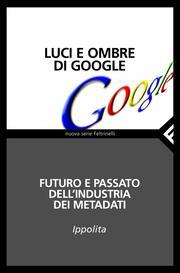The Dark Face of Google by the Ippolita Collective - ISBN 8807710277 - Feltrinelli 2007
Motivation
Numerous debates (leading to GoogleIsEvil) on the potential risk of Google business model being to resell information about its users to commercial actors.
Pre-reading model
Draw a schema (using PmGraphViz or another solution) of the situation of the area in the studied domain before having read the book.
Reading
- Introduction
- Chapter 1 The History of Search (Engines)
- "since usage of the service [GMail] was spreading by way on invites already registered users could freely extent in her circle, Google obtained crucial information on individual networks of friends and acquaintances." (p14)
- Chapter 2 BeGoogle!
- Chapter 3 Google Open Source
- Chapter 4 Algorithms or Bust!
- "algorithms aren't some kind of arcane procedures concerning and known only to a handful of specialists, they are devices that profoundly influence our daily lives, much more so than would appear at first sight." (p40)
- Chapter 5 As bonus: other funky functionalities
- "Google's spider is constantly busy copying the Internet into its database" (p52) is actually wrong, it's copying a fraction of the Web, that's just a fraction of the Internet, for example it does not include torrents
- "the search shows no coherence with the body of data extent on that indexed part of network." (p52) that I experience on a daily basis based on how often my own content (including) this page is indexed (as seen in the traffic logs) and how "old" the actual search results are
- The 'strategy of objectivity' pursued by Google emphasizes scientific research, academic excellence, technological superiority, and sophisticated interfaces. But) This is merely a veil occulting the frightening prospect of a single access point to all data generated by naive users." (p58)
- Chapter 6 Quality, Quantity, Relation
- mention of epistemology and the limit of "objective and fast" search versus conducting the research process yourself
- Chapter 7 Technocracy
- "what we witness, is an enforced extension of the peer review system - which works all right within the academic system" (p67)
- even that seems debatable according not just to practitioners cf HplusSummitHarvard and Publish or Perish (PoP) by Anne-Wil Harzing but also by epistemologists (Paul Feyerabend and late Imre Lakatos)
- between these two extremes, techno-hate and techno-craze, it should be possible to advance the curiosity which is associated with the hacker ethic, viz. the sharing of knowledge, the critical attitude towards 'truths', the rigorous verification of sources, all that while going for the way of open knowledge and free circulation of information." (p67)
- "The hybrid [natural and cultural] character of networks is the necessary consequence of of the hybrid character of the technology itself." (p69)
- mention of cryptography and the Freenet project
- Conclusion
- "Google pushes this feedback loop logic to its extremes: it is an extraordinary machine that manufactures itself through the very use its users make of it. In this sense it is an 'autopoetic' machine, which accumulates all base information millions of users insert daily into the Web (such as names, pictures, e-mails, search preferences, membership of forums, blog writings and readings, filling in of forms and surveys, browsing trajectories, etc.) and uses it for targeted, 'capillary' advertising. " (p75)
See also
Overall remarks and questions
Synthesis
So in the end, it was about X and was based on Y.
Critics
Point A, B and C are debatable because of e, f and j.
Vocabulary
(:new_vocabulary_start:)
new_word
(:new_vocabulary_end:)
Post-reading model
Draw a schema (using PmGraphViz or another solution) of the situation of the area in the studied domain after having read the book. Link it to the pre-reading model and align the two to help easy comparison.
Categories
Back to the Menu
Other read books linking to the TheDarkSideOfGoogle page :
Back to the Menu
 Fabien Benetou's PIM
Fabien Benetou's PIM







